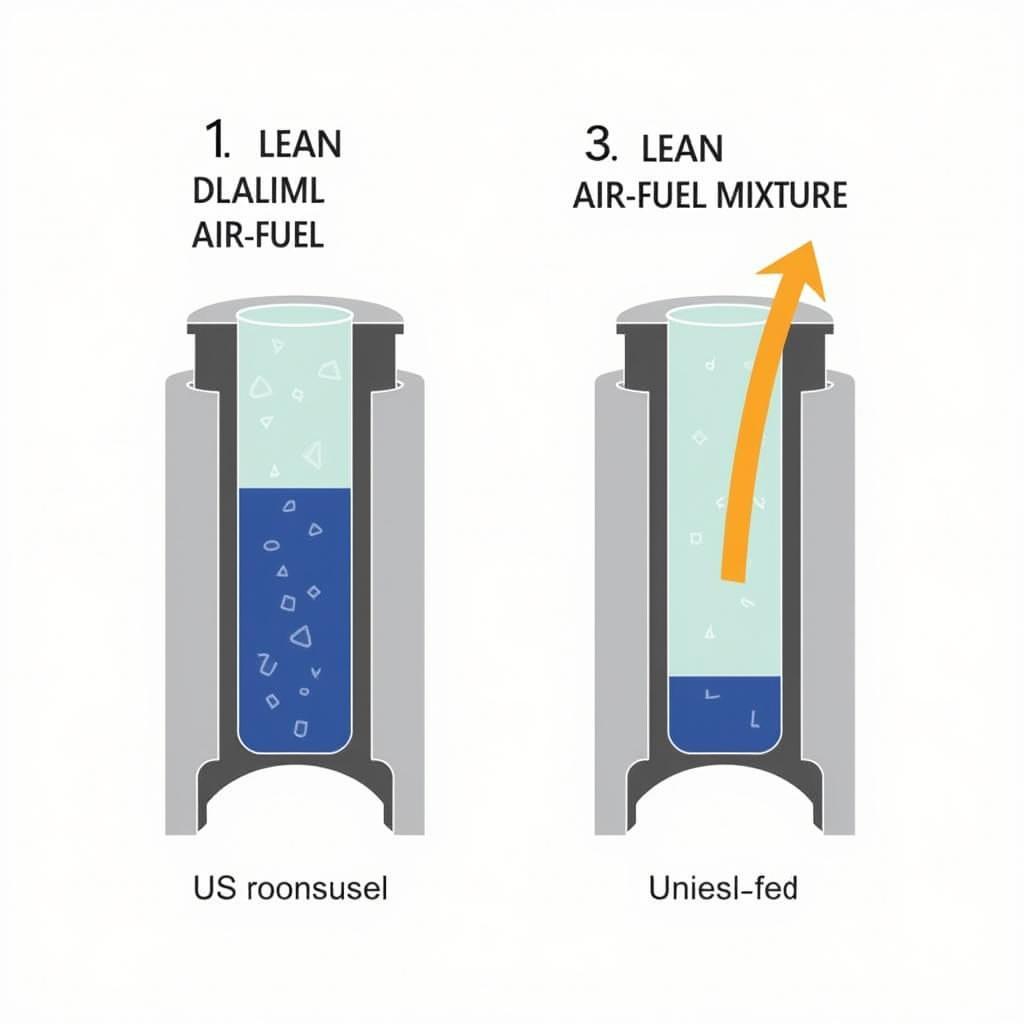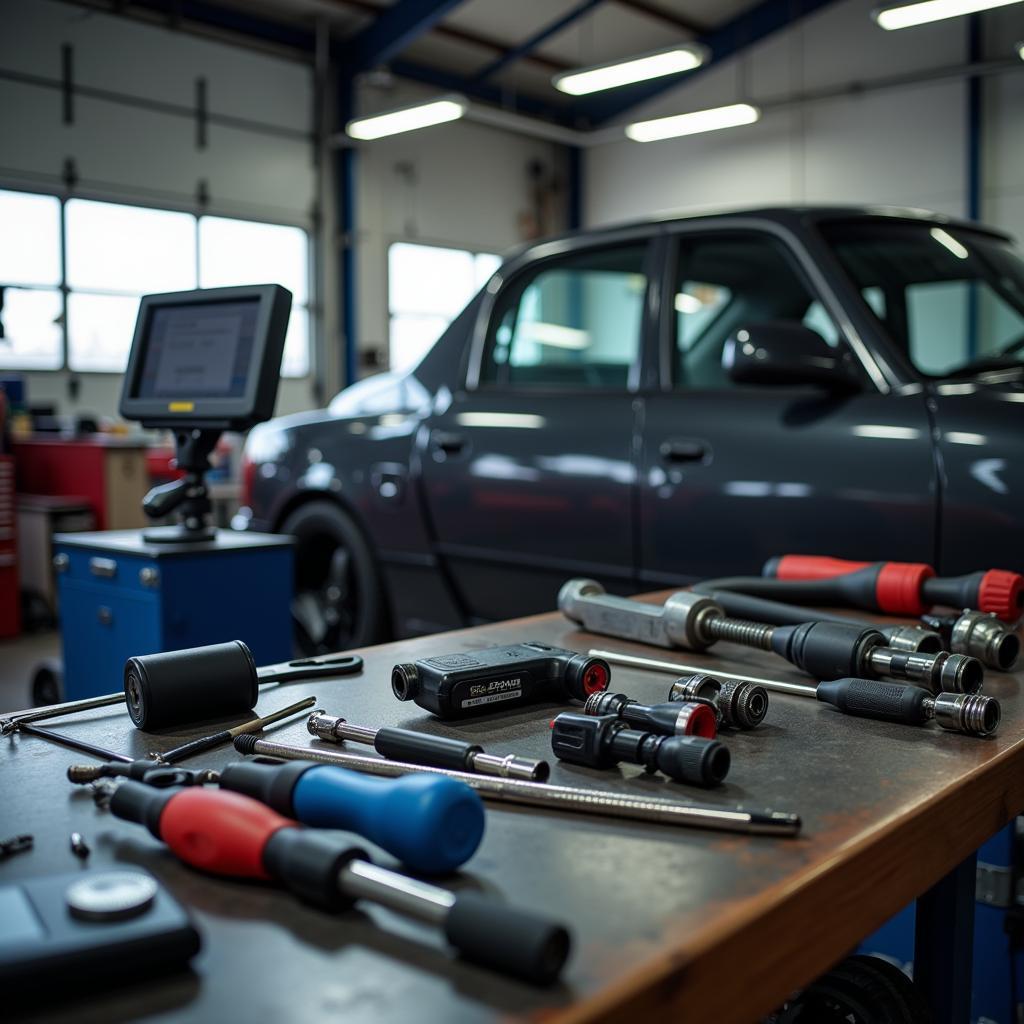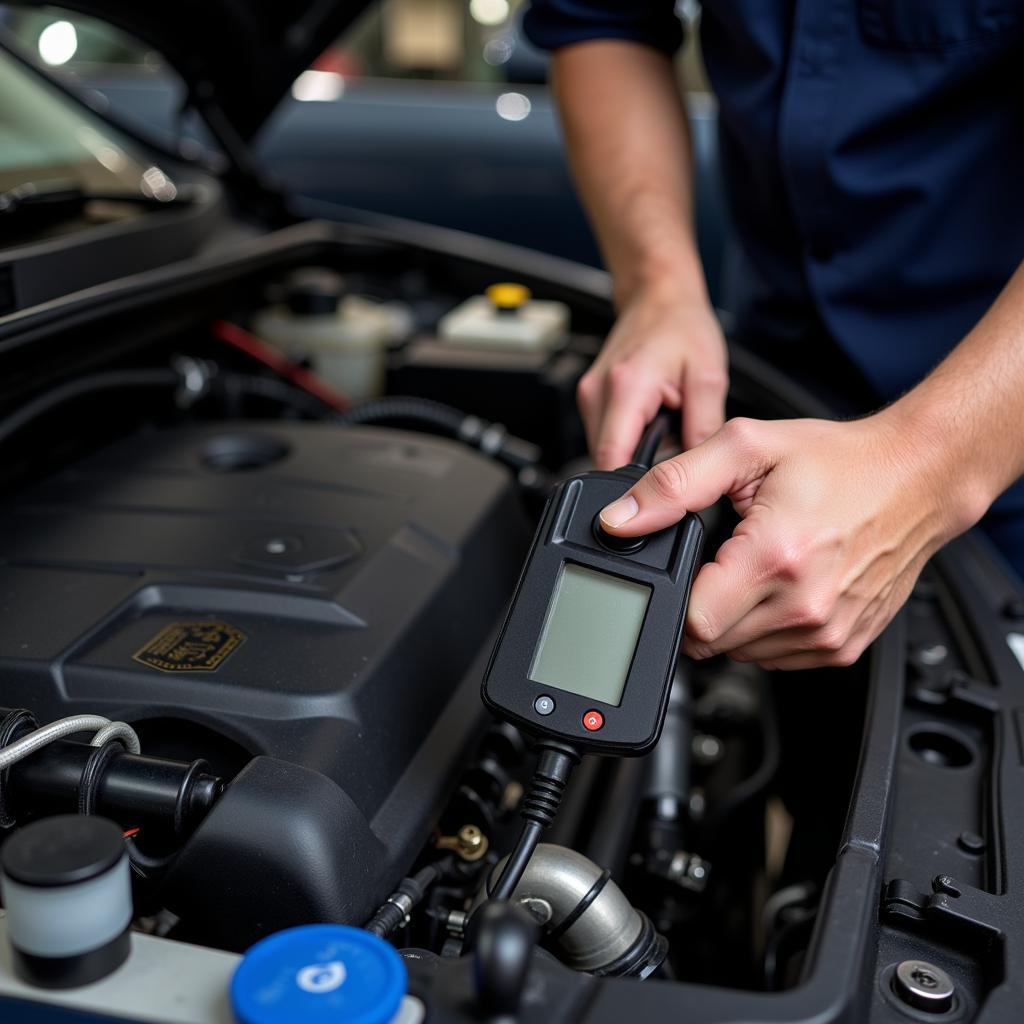You’re driving down the road and your check engine light pops on. An unsettling feeling washes over you as you wonder what could be wrong. You pull over, grab your trusty OBD2 scanner, and plug it in. The code reads: P0171. This means your car’s engine control module (ECM) has detected a lean condition in the air-fuel mixture for engine bank 1. But what does that mean, and how serious is it?
This comprehensive guide dives deep into Car Diagnostic Code P0171, explaining everything you need to know about its causes, symptoms, and solutions.
What Does a P0171 Code Mean?
Let’s break down this common trouble code:
- P0171: This alphanumeric code refers to a specific problem detected by your car’s onboard diagnostic system (OBD-II).
- System Too Lean: This indicates an imbalance in the air-fuel mixture entering your engine’s combustion chamber. “Lean” means there is too much air compared to fuel.
- Bank 1: This applies to vehicles with engines that have two cylinder banks (V6, V8, etc.). Bank 1 typically refers to the side of the engine containing cylinder #1.
In essence, a P0171 code means your engine is running on a lean air-fuel mixture in one of its cylinder banks. While a perfectly balanced air-fuel ratio is ideal, a slightly lean mixture isn’t inherently bad. However, a significantly lean mixture can lead to performance issues and potential engine damage.
 Lean Air-Fuel Mixture Illustration
Lean Air-Fuel Mixture Illustration
Common Symptoms of a P0171 Code
While the check engine light is the most apparent sign, your car might exhibit other symptoms, including:
- Rough idling: The engine might vibrate or shake excessively when the car is stopped.
- Misfires: You might feel a jerking sensation during acceleration or while driving at a constant speed.
- Hesitation: The engine might respond slowly when you press the accelerator.
- Increased engine noise: A ticking or knocking sound coming from the engine could indicate a lean condition.
- Reduced fuel efficiency: A lean mixture can sometimes trick the engine into thinking it needs more fuel, leading to decreased gas mileage.
What Causes a P0171 Code?
A variety of factors can cause a P0171 code. Here are some of the most common culprits:
-
Vacuum Leaks: One of the most frequent causes is a leak in the intake manifold or vacuum hoses. These leaks allow unmetered air to enter the engine, disrupting the air-fuel ratio.
-
Faulty Oxygen Sensor (O2 Sensor): The oxygen sensor monitors the oxygen content in the exhaust gases and relays this information to the ECM. A malfunctioning O2 sensor might provide inaccurate readings, causing the ECM to create a lean mixture.
-
Dirty or Defective Mass Air Flow (MAF) Sensor: The MAF sensor measures the amount of air entering the engine. If it’s clogged or faulty, it can send incorrect data to the ECM, resulting in a lean condition.
-
Fuel System Problems: Issues within the fuel system, such as a clogged fuel filter, weak fuel pump, or malfunctioning fuel injectors, can restrict fuel flow to the engine, leading to a lean mixture.
-
Exhaust Leaks: While less common, leaks in the exhaust manifold or exhaust pipes before the oxygen sensor can also cause inaccurate readings and trigger a P0171 code.
 Car Diagnostic Tools in a Mechanic Shop
Car Diagnostic Tools in a Mechanic Shop
Diagnosing a P0171 Code: A Step-by-Step Guide
Diagnosing the root cause of a P0171 code requires a systematic approach:
-
Check for Vacuum Leaks: Visually inspect all vacuum hoses and the intake manifold for any cracks, loose connections, or damage. You can also use a carburetor cleaner to spray around potential leak points while the engine is idling. A change in engine RPM indicates a leak.
-
Inspect the Air Intake System: Examine the air filter for dirt and debris. A clogged air filter can restrict airflow and cause a lean mixture.
-
Test the Mass Air Flow (MAF) Sensor: You can test the MAF sensor using a multimeter. Consult your vehicle’s repair manual for specific testing procedures. If the sensor readings are out of range, it likely needs replacement.
-
Check the Oxygen Sensors: Inspect the oxygen sensors for any damage or excessive carbon buildup. You can also test their functionality using a multimeter or an OBD2 scanner with live data capabilities.
-
Inspect the Fuel System: Check the fuel pressure using a fuel pressure gauge. Low fuel pressure could indicate a clogged fuel filter, a weak fuel pump, or other fuel delivery problems.
How to Fix a P0171 Code
Once you’ve pinpointed the culprit behind your P0171 code, the solution will depend on the specific issue:
- Repair Vacuum Leaks: Replace any cracked or damaged vacuum hoses. Tighten any loose connections and seal any leaks in the intake manifold.
- Replace Faulty Sensors: Replace any malfunctioning oxygen sensors, MAF sensors, or other faulty sensors related to the air-fuel mixture control system.
- Clean or Replace Air Filter: Clean or replace a dirty air filter to ensure proper airflow to the engine.
- Address Fuel System Issues: Replace a clogged fuel filter. If the fuel pump is weak, it might require replacement. Have a qualified mechanic diagnose and repair any issues with the fuel injectors.
- Repair Exhaust Leaks: Repair any leaks in the exhaust manifold or exhaust pipes.
It’s important to note that attempting DIY repairs on your car’s engine can be risky if you’re not familiar with automotive mechanics. If you’re unsure about any of these steps or lack the necessary tools and experience, it’s best to consult a qualified mechanic.
 Mechanic Inspecting a Car Engine Using a Diagnostic Tool
Mechanic Inspecting a Car Engine Using a Diagnostic Tool
Car Diagnostic Code P0171: FAQs
Q: Can I still drive my car with a P0171 code?
A: While you might be able to drive short distances with a P0171 code, it’s not recommended. Driving with a lean condition can lead to further engine damage and reduce fuel efficiency.
Q: How much does it cost to fix a P0171 code?
A: The cost of repair can vary widely depending on the underlying cause. Simple fixes like replacing a vacuum hose or cleaning a MAF sensor can be relatively inexpensive. However, more complex repairs, such as replacing fuel injectors or oxygen sensors, can be significantly more costly.
Q: Can using the wrong type of fuel cause a P0171 code?
A: While using the wrong fuel (such as putting diesel in a gasoline engine) can cause significant engine problems, it’s unlikely to directly trigger a P0171 code.
Q: How can I prevent a P0171 code in the future?
A: Regular vehicle maintenance, including scheduled tune-ups, air filter replacements, and fuel system inspections, can help prevent many of the common causes of a P0171 code.
Need Further Assistance?
Facing car troubles? Don’t hesitate to reach out! Our team of automotive experts is available 24/7 to provide you with personalized support and guidance.
Contact us via:
- WhatsApp: +1(641)206-8880
- Email: [email protected]
We’re here to help you get back on the road with confidence.

Leave a Reply